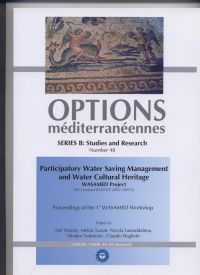| Article précédent | p. 297-303 | Article suivant |
Participatory irrigation management: a socio-anthropological perspective
Participatory Irrigation Management schemes may superficially appear to be simple administrative measures but can in fact prove to be complex operations with far-reaching social consequences. They must therefore be tailor-made for each situation and to ensure success, the social and cultural background of the population involved have to be considered. The paper gives a brief overview of some social and anthropological aspects of water usage in agriculture in order to understand how local communities look upon and react to the changes brought about by a reduction in the government's role of irrigation management and a consequent increase in their own responsibilities. It is not a description of a specific regional or national situation - though some references to particular Mediterranean characteristics are included - but a general discussion about some socio-anthropological principles relevant to the privatisation process of irrigation networks. The respective advantages to governments and farmers are outlined, as are some problems and misunderstandings that may arise.
- [ Afficher ]
- [ Télécharger ]
- [ Exporter la citation ]
Vous pouvez télécharger la citation au format :
- [ Imprimer ]
-
Mots-clés
ASSOCIATION D'AGRICULTEURS, EAU D'IRRIGATION, GESTION DE PROJET, IRRIGATION, PARTICIPATION, PERIMETRE IRRIGUE, RESEAU D'IRRIGATION, RESSOURCE EN EAU, SYSTEME DE VALEURSCiter cet article
Vella A. Participatory irrigation management: a socio-anthropological perspective. In : Hamdy A. (ed.), Tüzün M. (ed.), Lamaddalena N. (ed.), Todorovic M. (ed.), Bogliotti C. (ed.). Participatory water saving management and water cultural heritage. Bari : CIHEAM, 2004. p. 297-303. (Options Méditerranéennes : Série B. Etudes et Recherches; n. 48). 1. WASAMED (Water Saving in Mediterranean Agriculture) Workshop, 2003/12/15-19, Sanliurfa (Turkey). http://om.ciheam.org/om/pdf/b48/05002302.pdf



